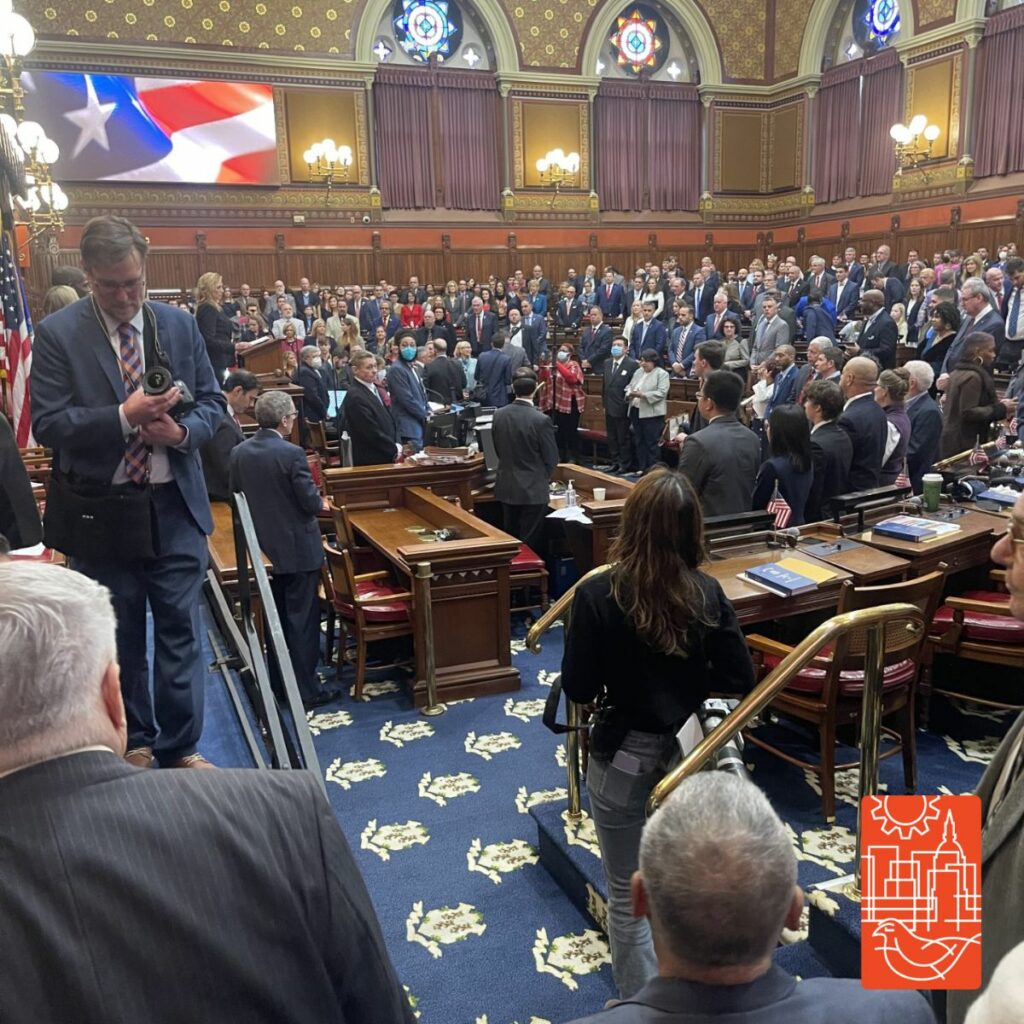CHEFA INSIGHTS for April 2024
Insight Highlights
A New Year Brings New Beginnings at CHEFA!
CHEFA Makes Significant Grant to Boost Family Childcare Providers in CT
FY 2023 Higher Education Sector Report Summary
April 2024 Legislative Update
Equipment Financing Through CHEFA EasyLoan Program

A New Year Brings New Beginnings at CHEFA!

This year marks a new beginning here at CHEFA. I am delighted to announce that we have relocated our offices to 1 Financial Plaza in Hartford, symbolizing a fresh chapter in our story of growth and excellence.
At CHEFA, our commitment to exceptional client service remains unwavering. We look forward to welcoming you to our new location and serving you with the same level of professionalism and dedication you have come to expect.
In this new year, we are not only settling into our new space but also exploring innovative products and opportunities to better support the state’s non-profits. Your success remains at the forefront of our priorities and key to our mission of enhancing the quality of life for state residents.
Thank you for your continued trust in CHEFA and we look forward to the exciting possibilities in the year ahead.
Warm regards,
Jeanette W. Weldon
Executive Director
CHEFA
CHEFA Makes Significant Grant to Boost Family Childcare Providers in CT
Connecticut Health & Educational Facilities Authority (CHEFA) has committed to providing $250,000 in Enterprise Capital philanthropic support in 2024-2025 so that All Our Kin, an organization that trains, supports and sustains home-based early childhood educators, can make its services accessible to many more providers, including those residing in the most rural parts of the state.
Read the full press release here:
CHEFA, ALL OUR KIN JOIN FORCES TO IMPROVE QUALITY AND SUSTAINABILITY OF FAMILY CHILD CARE IN CT
FY 2023 Higher Education Sector Report Summary

At the Board of Directors Meeting held on March 19th, Ms. Johnson, Compliance Specialist, presented a review of CHEFA’s Higher Education Sector report, which includes financial operating results for FY 2023 and market demand results for FY 2024.
This sector report reviews the performance of the ten private institutions that comprise CHEFA’s higher education portfolio, consisting of 61 bond series with $4.92 billion outstanding.
Demand: Most of the ten private Connecticut based institutions that make up CHEFA’s higher education portfolio have experienced increased market demand in FY 2024 across four key indicators: applications, selectivity, matriculation, and enrollment. Application volume remains very strong, at it’s highest level in FY 2024, up 20% from FY 2020, resulting in an improved selectivity rate during this time. Total FTE enrollment is at its highest level in the past five years despite slightly lower matriculation yield medians.
Key Financial Ratios: FY 2023 financial results reflect a stable view of the sector despite weaker operating performance as expenses outpaced revenues. The net tuition revenue median declined from the prior year. The portfolio remains heavily reliant on tuition and auxiliary revenue, with the median accounting for approximately 79% of total revenue. The EBIDA margin median decreased from 17.1% in FY 2022 to 15.2% in FY 2023 but has increased from 13.7% from five years ago. The portfolio is still considered leveraged but remains manageable across the sector with a lower debt service burden median and a strong debt service coverage ratio median at 3.1 times.
Total cash and investments declined 1.0% from the prior year but is 43% higher than it was five years ago. The cushion for debt median remained relatively flat over the past five years, averaging just under 2.0 times. The total cash and investments to operations median also remained flat from the prior year but is approximately 16% higher from five years ago. Five institutions had at least a favorable 2.0 times coverage in FY 2023 while one institution had less than a one-year’s cushion for operations. The FY23 monthly days cash on hand median of 365 days declined for a second consecutive year from its high of 456 days in FY 2021 but remains 4.3% higher than from five years ago. FY 2023 individual medians of the private institutions varied significantly from a low of 50 days to a high of 815 days.
Total capital investment for the portfolio, increased 17% over the past five years with 100% of the portfolio investing more in their plant than their annual depreciation expense in FY 2023 compared to only 60% from five years ago. The FY23 median capital spending ratio of 2.1 times in FY 2023 increased from 1.5 times over the past five years and is at its highest level.
Credit Outlook: All but one of the private institutions have a credit rating with one or more of the rating agencies. Moody’s overall outlook of the higher education sector for the next 12-18 months predicts a stable environment where expense and revenue growth will move closer to equilibrium. Expense growth will moderate as inflation cools, preventing further deterioration in operating performance for most of the sector. Financial reserves will remain sound as stronger investment returns and growing gift revenue help to mitigate budget gaps. Leverage will decline as high interest rates dampen borrowing, but future capital needs will require addressing.
To learn more about CHEFA’s Higher Education Sector report for FY 2023 and the performance of its ten private institutions that make up our higher education portfolio, please contact Michael Morris, Managing Director, at mmorris@chefa.com.
April 2024 Legislative Update

Connecticut is facing a pressing challenge: a shortage of accessible and affordable childcare options. This issue isn’t just a matter of convenience; it’s a barrier to economic participation and it limits children’s access to opportunities for early growth and development. Importantly, while the issues facing Connecticut’s childcare system are complex and pervasive, they are particularly pronounced in under-resourced communities.
Accordingly, solving this complex problem requires a multifaceted approach and collaboration among various stakeholders, including quasi-public entities.
The involvement of quasi-public entities, like the Connecticut Health and Educational Facilities Authority, or CHEFA, is important due to their ability to operate efficiently and effectively in carrying out initiatives that support important statewide objectives, such as enhancing the quality of, and access to childcare throughout Connecticut. Quasi-public entities can help streamline processes, facilitate the effective allocation of resources, and ensure that initiatives are implemented with maximum impact.
Furthermore, quasi-public entities can leverage their expertise and resources to help drive collective action and facilitate the implementation of programing that reflects the complex nature of the many issues facing Connecticut’s childcare system. Programs like CHEFA’s proposed Early Childhood Education Tax Credit Program are an example of how quasi-public entities can play a valuable role in helping government agencies, businesses, childcare providers, and community organizations design and implement targeted and impactful programing to address one of Connecticut’s greatest challenges.
The proposed tax credit program would incentivize businesses to make contributions to the CHEFA Community Development Corporation in exchange for state tax credits. These contributions would in turn be used to provide financial assistance to licensed childcare centers, family childcare homes, and group childcare homes located in areas identified as childcare deserts. By providing financial assistance for construction, renovation, acquisition of facilities, equipment, and supplies, as well as working capital expenses, it addresses the diverse needs of childcare providers. Moreover, investments in these communities are essential for addressing systemic inequities in access to childcare, and by targeting areas designated as childcare deserts, the program aims to prioritize resources where they are most needed, ensuring that under-resourced communities receive the support they need.
The efficacy of any initiative aimed at tackling Connecticut’s childcare dilemma hinges on the collaboration of all stakeholders working to collectively develop and implement strategies that not only increase the availability of childcare but also enhance its quality and affordability. Government, employers, childcare providers, quasi-public entities, and other stakeholders must come together to develop and implement strategies that increase the availability, quality, and affordability of childcare throughout Connecticut.
CHEFA is ready and willing to work with all stakeholders to design, implement, and administer programming aimed at addressing Connecticut’s childcare crisis because through targeted efforts and collective impact, it is possible to break down barriers to access and create opportunities for all children and families to thrive.
Equipment Financing Through CHEFA EasyLoan Program
One of the many challenges CFOs face is helping their institutions acquire the equipment necessary to deliver their services in a cost-effective manner. This requires selecting the best manufacturer, ensuring that manufacturer has a good service/maintenance network in the area, and how best to pay for the equipment—whether that’s tax-exempt loans, cash, lines of credit or bonds.
CHEFA provides a tax-exempt financing alternative (“EasyLoan Program”) for the purchase of capital equipment and associated improvements. CHEFA’s EasyLoan Program utilizes a secured equipment loan structure where the loan is privately placed with a commercial lender, which will loan the money, through the Authority, to the institution, and take a lien on the equipment and other financed improvements as collateral.
Eligible equipment includes, but is not limited to:
- Medical, diagnostic and laboratory equipment
- Computer networks and equipment
- Telecommunications equipment
- Vehicles
- Energy management systems
Renovations associated with equipment installations may be financed as part of the project as long as these expenses do not exceed 25% of the overall financing amount. The term of the loan cannot exceed the useful life of the assets financed.
The program features an abridged application process, standardized loan documentation and expedited closing (usually within 90 -120 days), and reduced financing fees compared to traditional bond financing. Loan sizes up to $10.0 million do not need CHEFA Board approval.
One of the unique features of the program is utilizing a Master Financing Agreement, which provides for future financings to be easily added, resulting in further reduced financing fees. In addition, the equipment is exempt from property taxes unlike a traditional lease.
CHEFA works with a number of commercial lenders, including Bank of America, Keybank, M&T Bank, and Webster Public Finance Corp. CHEFA and our partners are committed to your success and look forward to working with you to address the equipment needs of your organization.
For additional information please contact:
Michael Morris
Managing Director, Client Services
mmorris@chefa.com